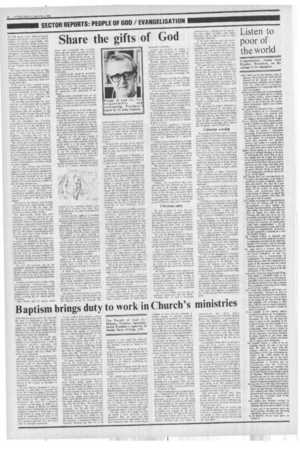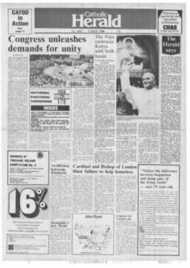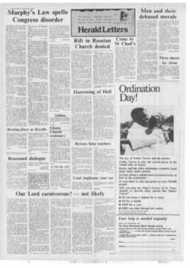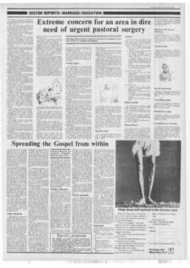Page 6, 9th May 1980
Page 6

Report an error
Noticed an error on this page?If you've noticed an error in this article please click here to report it.
Tags
Share
Related articles
Npc Delegates Issue Pastoral
Extreme Concern For An Area In Dire Need Of Urgent...
Baptism Brings Duty To Work In Church's Ministries
How The Bishops Set Out The Nature Of The Church
'we Will Follow The Signposts'
Share the gifts of God
AS THE Sector of the National Pastoral Congress most directly concerned with the subjects of shared responsibility and consultation within the People of God. we unanimously express our deep appreciation of the initiative undertaken by the Bishops' Conference of England and Wales, with the full support of our Holy Father, Pope John Paul II, to convene this historic National Pastoral Congress, in order to enlist the full resources of the whole Church in England and Wales in a review of the pastoral work of that Church, and in planning for its future.
We thank God for the joyful privilege and experience of Christian sharing with our brothers and sisters. Bishops, priests. deacons, religious, laity and representatives of other Churches, which have been ours during these days.
In the various topics entrusted to our consideration, the overwhelming number of proposals was carried unanimously, or with near unanimity. or by a very large majority. In very many instances the number of delegates opposed was consistent and very small indeed.
We resolved overwhelmingly that there must be a wholehearted call to spiritual renewal and commitment in all of us: bishops. clergy and laity, and we recommend that all members of the Congress resolve to make that call heard, first in their own hearts, and then in the milieu in which they live.
We also recognise that Christian stewardship in its fullest sense must be seen as the use of all we are and have, soul, body, time and wealth. wisely and generously for the love of Christ to the glory of God and the good of our neighbour, knowing that we will be accountable to God for such use, since we only return to God what is rightfully His.
We affirm that local provision must be made for instruction and training in prayer, acknowledging the Church to a school of prayer. public (in the Divine office), private and ecumenical, and we strongly urge that greater use of the Prayer of the Church be made in churches and homes, and also that, in addition to liturgical worship, traditional services, both eucharistic and other, should be made available.
We strongly affirm that Christian 'ormation and education are vital at every aage of life, and we therefore call upon the Bishops to take every opportunity to insist pn continuing formation for all, lay and clerical. and to provide as far as possible human and material resources to build up the necessary programmes.
In view of the fact that the teachings of Vatican II are not being sufficiently implemented, urgent provision and consideration should be given to a deeper formation of priest and people so that they may work together in the spirit of the gospel. The diocese and deanery must develop adult formation as a major priority. readily available to all so that the spirit and teaching of the Second Vatican Council can be received by God's people. We unanimously affirm that each individual is called by Christ to life in community by his Baptism. and we also affirm that whatever structures are needed in Christian community should be there to assist the people of God to increase their personal spiritual relationship with God and with one another, including the mutual love for each other which should exist between priests and people.
We strongly affirm that the Eucharist as a community celebration should involve maximum participation of the laity, each performing his or her respective role; that the eucharistic community be a welcoming one to newcomers, visitors and others, and that the sense of community created in celebration should issue into caring for the community outside celebration and issuing into mission for those who do not belong to the Church.
Not only the eucharist, but all . the sacraments should be acknowledged as in principle community celebrations. which should involve the whole community, and baptism and annointing of the sick should take place during the eucharist as and when possible. In order to become such a loving, caring, worshipping community, we overwhelmingly recommend that. parishes should become a communion of Christian communities incorporating small. neighbourhood, area, and special interest groups including all, the lapsed and the practising.
They should meet For prayer. social events and occasionally the eucharist. supporting one another in times of stress, sorrow and joy. Such small groups, house groups and neighbourhood groups, for prayer, study of scripture, and celebration of the eucharist, especially for the sick, the housebound and the handicapped must be seen as necessary for the building up of the parish community and as an aid to celebration. , Liturgical groups should be established in parishes to work with the clergy, and as a consequence of our common participation by baptism in the priesthood of Christ, the maximum involvement and ministry of the laity, both men and women, without discrimination, should be encouraged in the preparation and celebration of the liturgy. Bishop, priest and people must set out together to implement the teaching and spirit of Vatican II in each and every parish. There is a need for the parish to promote itself to its own parishioners and to people outside.
We should make use of the media, and seek help from the diocese or deanery information officer where needed. Practising Catholics must make every effort to care for our lapsed brothers and sisters. They should be encouraged to take part in all parish life even though they may not he able to receive the Sacraments. Priests should encourage parishioners to recognise their right to exercise their lay ministry and should welcome their cooperation. Parishes can only be truly Catholic if they seek to establish good positive relationships with other churches. Since the parish priest is a key figure insofar as Catholic involvement in ecumenism is concerned, the Bishops are strongly urged to use the occasion of their parish visitations to help their priests realise that concern for unity is an essential characteristic of the Catholic Christian.
Bishops should encourage priests to use facilities ecumenically at local level. There should be Catholic sharing wherever rss L). spiel
I ©(I )D •
possible in joint Christian mission, since such joint mission can also help tremendously in the work of building unity at local levels.
Catholic parishes ought to be members of local Councils of Churches, if necessary taking the initiative to form such a Council. Each parish should be made aware of its responsibilities for contributing directly a percentage of its ordinary income to the Third World and the Church in need, either through CAFOD or other approved organisations, or by direct twinning in consultation with the Bishop of thc diocese. The permanent diaconate is recommended and seen as a necessary ministry in the pastoral work of the Church and in order to spread stewardship in local areas, ministries such as diaconal service should be encouraged as ministries of action both spiritual and practical. With these ministers as leaders and in support of the local priests, the full involvement of parishioners should be sought and in this way Christian stewardship could be made to be and seen to be effective.
A basic training and instruction in organisational and financial matters should be given both in seminary and even more importantly at in-service training courses after priestly ordination. There should be review of the system of appointing parish priests by seniority to ensure appropriateness — matching the needs of the area to the priest.
His term of office should not be so short that he cannot get to know his people; on the other hand, after a period of ten years the situation should be reviewed. The parish should become aware of the pool of talent available in a parish not only of those actively involved in various organisations but also those who are prevented by age, sickness or other serious reasons from active participation and who by their prayers as 'lay contemplatives' could constitute a spiritual powerhouse of the parish.
Young people are part of the Church today, not just-of the Church of the future. They should be encouraged to fulfil this role in ways appropriate to them in the local Church.
A national programme of education in the practical responsibilities of Christian stewardship in its full meaning should be set in train by the Conference of Bishops.
This should include each parish being asked to consider carefully how to find ways of raising the level of consciousness amongst parishioners in Christian stewardship. To this end parishes should plan their activities over, say, a three years cycle based on perceived local priorities and subject to annual review. This planning would include all activities, ranging from the life of prayer of the individual, the liturgy, the development of organisations, adult religious formation, the ecumenical movement. social welfare services to those in need both in the parish and in the wider community: the regular maintenance of buildings and the use of schools and the plannin,g of new buildings, where necessary.
In this way the total available resources of time, talents and finance could be more effectively deployed, and suitable structures such as parish councils be brought into being where they do not exist. In the light of Lumen Gentium we feel that the presence of a parish and deanery or area council is necessary for the right ordering and mission of the local church. Parish, deanery and diocesan councils are appropriate channels through which consultation can he set in motion, and when these bodies are truly representative of Bishops, priests and people they facilitate the exercise of co-responsibility.
Therefore we propose that an active council. open and representative, should be established as an essential component in the life and organisation of every parish. Such a council should have the right and duty to discuss with the parish priest all matters affecting the parish as a community and to make recommendations to him.
Where the final decision belongs to the parish priest the council is entitled to an explanation of any refusal which he may make to its recommendations.
Deanery Pastoral Councils representative of priests and people should be established as a means of co-ordinating and influencing the thought and work of parishes within the deanery. A team ministry of priests and lay people should be developed at deanery level to meet special needs or provide special services which cannot be, or are not, provided at parish level. The availability of these services should be made known Greater co-operation of priests in parishes within deaneries is needed in regard to times of Mass, opportunity for confession. marriage instruction, etc., to reduce the work load on individual priests. Regular deanery meetings should be arranged for clergy and laity, drawing upon expert co-operation to provide information and experience in the liturgy, and diocesan liturgical commissions should aid deanery based groups with their knowledge and experience. When a diocese is too large for a Bishop to identify himself with his people as the true pastor, then either smaller dioceses should be established or area Bishops should be appointed.
Some form of equitable financial sharing should be made in the deanery or dioceses to offset parochialism. which could lead to major financial problems for some priests. An effective system of communication within each diocese, deanery and parish is needed so that information can pass freely between Bishop. priests and people.
The Bishops should do all in their power to encourage the sharing of the resources of the Churches, recognising that continuing to construct separate plants can help to institutionalise our division and to impede progress to unity.
A diocesan pastoral council representative of Bishops, clergy and laity should be established in every diocese to communicate and co-ordinate thought and work within the diocese, and to assist in the creation and direction of a pastoral
strlan each diocese where this does not exist already, the Finance Board should include suitable qualified laity, and appropriate diocesan and parochial financial statements should be readily available in parishes.
Each diocese should maintain in some appropriate form the organisation set up for the Congress. in order to facilitate communication concerning Christian stewardship in the full sense described above.
The need for solidarity and co-operation among Christians is essential in what is often described as a godless society. Therefore we recommend most strongly that practical steps be taken to consult with other Churches about areas of fruitful collaboration.
Further, we recommend that consultation with other Churches be built into the work of all diocesan, deanery and parish councils. In addition to this overall vision of the Christian community which we also strongly insist is, and must be, a practicable reality, we have the following further particular points to stress in the areas of Christian unity and of worship.
Christian unity
We give thanks to God for the marvellous progress towards Christian unity which has taken place during the past fifteen years. We acknowledge the work of the theologians who have done so much for the cause of Christian unity during the last decade through their work on various Commissions; and we express our gratitude to all those concerned for their tireless work for unity over many years.
We urge the Bishops always to keep in mind the principle that Christians in their separation should do everything together except what conscience forces them to do apart, and should encourage its observance by the Catholics of this country.
Since our remaining outside the British Council of Churches puts a permanent question mark against the serious commitment of our Church in this country to the cause of Christian unity, we strongly urge the Bishops to reconsider the question of the entry of the Catholic Church in England and Wales into the British Council of Churches.
We recommend that encouragement he given to the establishment of joint Christian schools, and that as much sharing as possible be undertaken in the training of priest and ministers. To ensure ecumenical continuity in a locality in spiteof changes or transfer of clergy we urge that local ecumenical covenants be established wherever practicable. We find it a terribly anomaly that our baptismal communion with our fellow Christians does not lead to Eucharistic communion as it should, and we long for the day when Catholics and other Christians will be able to meet in total Eucharistic fellowship.
At the same time we reject any movement towards indiscriminate inter communion. We recognise, however, that the possibility now exists of inviting our fellow Christians to receive Communion at the Catholic Mass in certain circumstances. And we ask our Bishops to reconsider the situation in England and Wales, and to consider the possibility of making provision for Eucharistic hospitality in certain cases. The cases we have in mind are those of the non Catholic partners in inter Church marriages who are already united through the Sacraments of Baptism and Matrimony. We urge that provision be made for the partner to be welcomed to communion in the Catholic Church, at least on special occasions, always providing that his or her Eucharistic faith agrees with that of the Catholic Church.
The occasions which we have in mind include the non Catholic spouse at a nuptial Mass, and close relatives of inter Church couples at weddings and funerals; the non Catholic spouse at a family baptism or confirmation, or other special family occasions.
We also urge the highest authorities in the Catholic Church to reconsider the implications of the statement of the phrase of the Second Vatican Council concerning Eucharistic sharing, that 'the grace to be won sometimes recommends it'. There voted for this resoluti,on on Communion and inter-Church marriages 209 in favour and 24 against, with 42 abstentions.
Christian worship
We strongly urge that in order to remedy lack of liturgical communication in diocese and parishes, and to ensure the provision of programmes of education and formation for a better understanding and celebration of the liturgy, a National Liturgical Institute be established in which both clergy and laity may he trained. The form of celebration of the Eucharist should arise from the nature of the group celebrating.
There should he the greatest possible variety of celebration of the one Eucharist (within the limits laid down by the present rite) to meet the needs of different conditions and ages; children, teenagers, ethnic groups and others. The reception of Holy Communion under both kinds should be regarded as the norm. And as many lay ministers, both men and women, as are necessary for this and other purposes should be trained and commissioned.
If and when baptism should have to be delayed through lack of faith on the part of parents, a service of blessing for their Infants should be held and efforts be made to give the necessary instruction to the parents.
Confirmation is best seen as part of the process of Christian initiation, and although this consideration is more important than discussion of the age at which it should be conferred, nevertheless a later age is necessary for young people to be able to make a genuine commitment of faith.
The celebration of Confirmation should be more frequent so that the numbers receiving it should not be too great, and its celebration should be more personal. Preparation for Confirmation involves more support from parents, schools and sponsors, and sponsors should have care for the candidates before, during and after the celebration of the sacrament.
Greater use should be made of penance or reconciliation services with individual absolutions. Opportunity should be provided for all who wish face to face confession. The conditions for general absolution should be reviewed.
Finally, in the atmosphere of Christian fraternal co-responsibility and relationship and in the one Holy Spirit of truth, we warmly commend to the Bishops' Conference of England and Wales the deliberations, resolutions and recommendations of this Sector at group, topic and Sector levels, together with those of the Congress in other Sectors.
And we wholeheartedly recommend and confidently anticipate, in the God-given spirit of joy in this Congress, a continuation development and extension at all levels in the Church of the processes of genuine shared responsibility and full consultation, which have been initiated in preparation fur, and during, this National Pastoral Congress.
blog comments powered by Disqus













